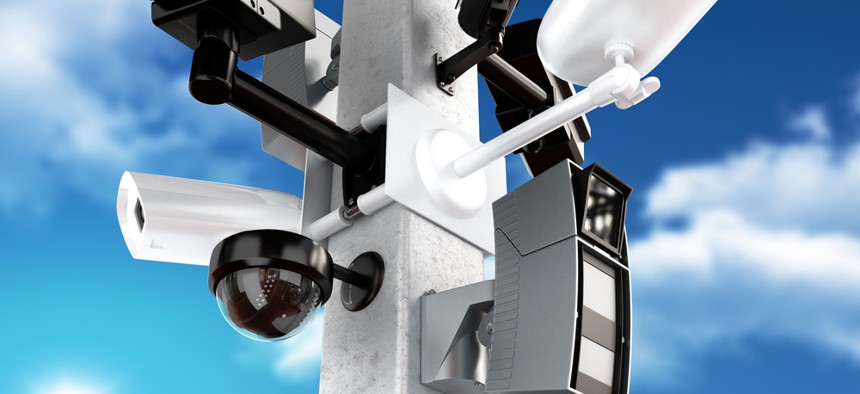
Image via Digital Storm/Shutterstock.com
Emerging Innovation and Social Media Trends: Networked Sensors
How networks of public and private sensors can change how the public sector operates during routine or emergency operations.
It's 1991, and some computer science professors are tired of walking into their computer lab of the University of Cambridge only to find an empty pot of coffee. Their solution: install a camera and connect it to the server so they could ascertain the status of the coffee pot from their desks. The rest is internet history.
Today, there are literally innumerable such cameras linked to the internet, many showing traffic, others surf conditions, and at least one streamed lice content from the ocean floor. But cameras are only the beginning of the story. Today, it is easy to connect a home or office thermostat to the internet, or even a door lock; and anyone can purchase a weather sensor and connect it to the internet. Parents of teen-age drivers can see their car--and many of its metrics--online and in real-time. Smartphones in themselves have become sensors: tracking their owners' movement (à la Waze) and tying it to their identity (a la Latitude, FourSquare, Facebook, and other applications).
The profusion of sensors poses both risks and rewards for government leaders, and has applications in the three areas of focus of this series, real-time data collection and analysis to drive decision-making; efficient use of physical and communication networks; and managing citizen participation in agency activities.
One of the greatest risks involved in the expanding network of sensors is running afoul of privacy laws. This is definitely one area of government operations in which the law is not entirely keeping pace with technology, and recent court cases--for example on law enforcement using GPS devices--have only begun to help government and citizens understand the roles and limitations of sensors in civic life.
Real-time data collection and analysis to drive decision-making
In dynamic situations, such as times of extreme weather and its aftermath, leaders are more able to make optimal decisions when they have accurate, up-to-the-minute information at their disposal. And more sophisticated sensors are being developed all the time to help in emergencies--for example, this FEMA-subsidized system to help firefighters understand what's going on inside a burning building. That's not not the only example.
Routine operations, too, can benefit from networked sensors. Only in February of this year did the FAA receive the funding necessary to switch from navigation based on radio to GPS, streamlining their day-to-day operations. Another example of sensors assisting in routine operations is an initiative by GSA and IBM to incorporate energy sensors into some government properties so that building managers can see real-time energy use and make adjustments accordingly to help bring down costs.
Efficient use of physical and communication networks
One of my favorite apps for my Android phone was the TriCorder (it has since been deleted from the Google Play store for copyright infringement). The app bundled a lot of different sensors together, including a wireless-signal detector, elevation, and sound meter. While the application was frivolous (but cool), other companies are using those same kinds of energy-wave sensors to do important things, for example, to optimize spectrum usage, especially in rural areas--an issue commonly referred to as "white space." The topic is contentious, but the ability to monitor that portion of the communications network and make decisions about their use in real-time would greatly increase their utility, both during ordinary and extra-ordinary circumstance.
Of course, monitoring traffic--by way of cameras or on-board sensors for trains and buses--helps governments at all levels make the most efficient use of traffic networks.
Managing citizen participation in agency activities
Perhaps one of the most sophisticated sensors that can be connected to the internet--especially through a mobile device--uses only millivolts of electricity and has two opposable thumbs. Indeed, humans interact with online sensors so seamlessly, they can be considered as a kind of sensor themselves. Because so many people carry always-on connected devices, they become part of the network that agencies can use to make decisions at the same time as they are helping to implement those very same decisions.
I alluded to one of the best examples of this in my last article: the USGS tracked tweets from people who were experiencing an earthquake. The Did You Feel it? program asks internet users to augment the USGS's sensors with their own experience of a seismic event..
The future of sensors
It is imperative for government leaders to begin to understand both the capacities and limitations of sensors now, so that they can be improved upon in the future. As I'll detail in a coming article on 3D Printing Plus and expand upon in Advanced Sharing, we are at the cusp of an age of open-sourced things, just as we are in the throes of open-sourced software. Sensors represent a prime target for tinkerers and products-on-demand manufacturing. But to be useful to government leaders, they need to be easily integrated into existing networks, which means carving a place for sensors now and building a place for real-time data into every decision-making process.
(Image via Digital Storm/Shutterstock.com)







